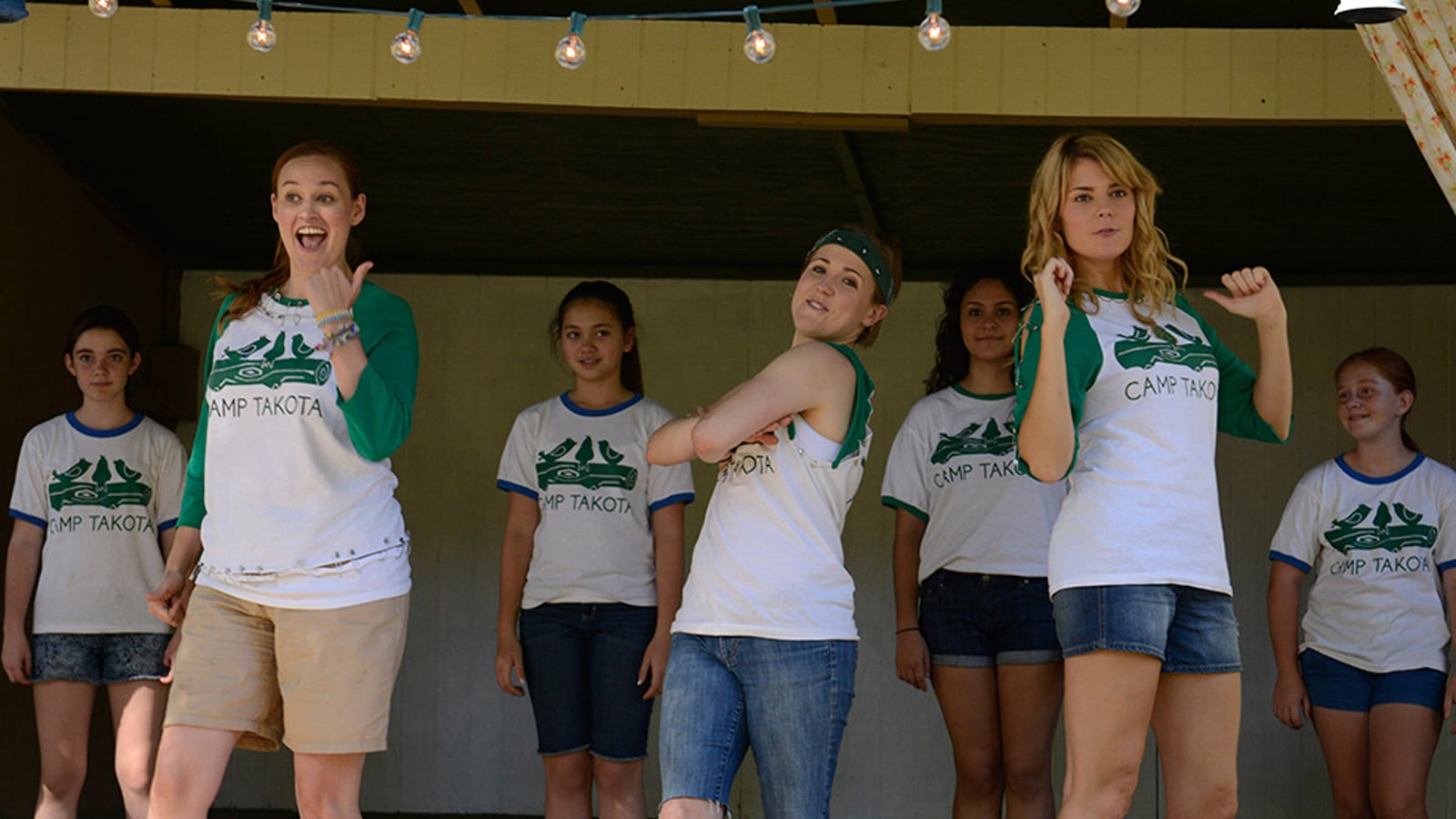“Every movie could be a camp movie,” says Mamrie Hart, one of the YouTube darlings who make up the Internet’s Holy Trinity. “Wolf of Wall Street could have been at a summer camp.”

The digital trio of Mamrie, along with Grace Helbig and Hannah Hart, will release their first feature film, Camp Takota, this Valentine’s Day. The film is about Elise’s (Helbig) return to the summer camp of her youth after a traumatic quarter-life crisis, only to find that her childhood friends Maxine (Mamrie Hart) and Allison (Hannah Hart), never left.
While this isn’t the first film released directly to the Internet, Camp Takota, is perhaps the first starring Internet titans. Hannah, Mamrie, and Grace’s status as the Holy Trinity is maintained not only by their unique brand of relatable hilarity and regularly produced YouTube videos, but their channels also attract 3 million combined subscribers and almost a million twitter followers. Their influence continues to grow in every media. Hannah Hart recently published her first book My Drunk Kitchen: A Guide to Eating, Drinking, and Going with Your Gut.
The idea for the film came from Mamrie’s experience as a counselor at an all-girl’s camp in college. In what was to be the final summer she worked at camp, she got dumped. So, naturally, she signed up for another year. “I thought, ‘I want to be nowhere that boys are,’” she says.
For over a year, she only had 20-30 pages of the script finished until a chance encounter between Hannah Hart and executive producer and head of RockStream Studios, Michael Goldfine, in February of 2013. Grace connected Mamrie and Goldfine, who was already trying to sell a camp movie. In the meantime, co-writer Lydia Genner was brought in to work on the first and second drafts of the script. By August they were shooting Camp Takota.
The setup from Mamrie’s original script remains largely intact in the final version of the film, but it was while working with Goldfine that the story expanded from a single protagonist to include the Holy Trinity. This, of course, was because Mamrie likes “any excuse to make a movie with your two best friends,” but also as “there are a lot more films popping up that depict female friendships as they are in real life.” Last November, the New York Film Academy released an infographic showing that from 2007-2012, of all the speaking characters in the top 500 films, only 30.8% were women. Meanwhile, of all the films released in 2013, those that pass the Bechdel test (by containing at least one scene in which two or more women have a conversation that is not about a man) earned approximately $1.5 billion more than those that did not. “That audience has been underserved,” Mamrie said. “I’m excited that we are giving them a full helping of it.”
Like the protagonists of other recent films featuring female multiple female leads, it is the characters’ flaws that signify their humanity. Of her character, Grace Helbig said she “has some really shitty things happen to her, and she gets drunk and signs up to be a camp counselor at the all-girls camp that she grew up going to, and she ends up rekindling old friends and maybe even new love, over the summer while being disconnected from technology and being surrounded by nothing but ladies and a few select gentlemen.”
Directed by Internet Icon creators, Nick and Chris Riedell, Camp Takota was originally set to be distributed by Chill.com, which went out of business in December of last year. The production then found a platform with VHX, an online video distribution service that allows content creators to sell their work online.
Made on a bare bones budget and filmed 40 minutes north of Los Angeles, near Santa Clarita, California, Grace says, “There was absolutely no cell phone service, so it really did feel like camp.”
Even the costumes reflect the DIY aesthetic of both camp and film. “There are a few times when my character has to dress up like a famous singer and you see that this counselor, as she would, clearly threw something together,” says Hannah.
Excitement on the Internet is palpable. Tweets from Camp Takota fans appear every few minutes announcing new pre-orders, plans for release day viewing parties, and unadulterated infatuation. Basic pre-order packages on the Camp Takota website give customers exclusive streaming and download access to the film on February 14, while additional “care packages” include movie posters, official Camp Takota clothing, and even a personalized video from the Hannah, Mamrie, and Grace ($300, limited to the first 100 customers). According to gigaom.com, care package sales have already generated $50,000.
When asked to describe their combined style the Trinity says, “on a collective scale, the three of us are a little bit sarcastic but it’s got a kindness and a sweetness to it. And it’s silly, and self-deprecating and hopefully relatable on a level of awkwardness and goofiness with best intentions but worse results.”
The camp film, like other uniquely American genres, has declined since the heyday of Meatballs and Ernest Goes to Camp. So it is fitting that an Internet foray into long form cinema both features a ne’er-do-well anti-hero and recalls a nostalgic landscape. According to Helbig, executive producer and director Goldfine frequently used the metaphor of “treating the camp like that old teddy bear you had when you were younger.” It might not look great anymore, but it’s so special to you because it’s full of so many memories.





